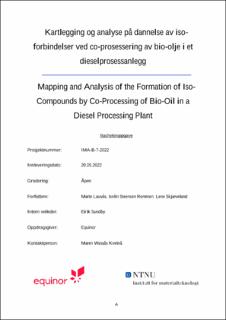| dc.contributor.advisor | Sundby, Eirik | |
| dc.contributor.advisor | Kveinå, Maren Wassås | |
| dc.contributor.advisor | Skjølsvik, Per Aksel | |
| dc.contributor.advisor | Kummernes, Jan Egil | |
| dc.contributor.author | Lauvås, Marte | |
| dc.contributor.author | Remmen, Iselin Steensen | |
| dc.contributor.author | Skjæveland, Lene | |
| dc.date.accessioned | 2022-07-06T17:20:37Z | |
| dc.date.available | 2022-07-06T17:20:37Z | |
| dc.date.issued | 2022 | |
| dc.identifier | no.ntnu:inspera:113593029:113594762 | |
| dc.identifier.uri | https://hdl.handle.net/11250/3003263 | |
| dc.description.abstract | Formålet med denne bacheloroppgaven var å analysere og kartlegge hvordan innblanding av bio-olje i et dieselprosessanlegg med deWax-katalysator og ulik reaktortemperatur vil påvirke karbonnummer og mengde iso-forbindelser til produsert diesel. Bio-olje tilsettes føden for å øke andelen av fornybart innhold i diesel. Når bio-oljen co-prosesseres i et hydrogeneringsanlegg sammen med konvensjonell diesel, dannes det større andel n-parafiner, hovedsakelig med kjedelengde på 18 karbonatomer. N-parafiner er rettkjedede parafiner, og er den enkleste typen hydrokarboner. De langkjedede hydrokarbonene har høyt tåkepunkt og blokkeringspunkt, som innvirker til utkrystallisering av voks, og må tas ekstra hensyn til under klimahardt vær. For å forbedre kuldeegenskapene til dieselen benyttes derfor en deWax-katalysator i hydrotreateren som forgreiner C18-parafinene gjennom isomerisering og til en viss grad cracker de til lettere hydrokarboner. DeWax-katalysatoren har økt aktivitet ved høyere temperatur, og kuldeegenskapene kan derfor forbedres ytterligere ved høyere reaktortemperatur.
Effekten av deWax-katalysatoren ble undersøkt ved å utføre en rekke undersøkelser av føde og produkt uten og med 10 % rapsolje, ved sommer- og vinterkvalitet og to ulike reaktortemperaturer. Gjennom gasskromatografi ble dieselprøvene separert etter kokepunkt, som har sammenheng med karbonkjedelengde. Ved å sammenligne toppene ved samme retensjonstid fra kromatogrammene, kan man kartlegge trender ved tilsats av rapsolje og økt reaktortemperatur. Våre funn viser en tydelig forskjell i mengde langkjedede karbonforbindelser for sommer- og vinterkvalitet, hvor andelen av de lengste kjedene var klart størst i sommerføden og -prøvene. For dieselprøvene behandlet ved den høyeste temperaturen, 360 °C, ble det observert en reduksjon i mengde C18. Den tilsvarende trenden ble bemerket for prøvene tilsatt 10 % rapsolje. C18-innholdet økte betraktelig ved tilsats av raps, men prøvene behandlet ved 330 °C ga høyere respons for C18 enn prøvene behandlet ved 360 °C. Det ble konkludert med at deWax-katalysatorens aktivitet øker med reaktortemperaturen, og dermed i kraft av reaktortemperaturen får gjenvunnet noe av kuldeegenskapene med bio-olje i føden. | |
| dc.description.abstract | The purpose of this bachelor thesis was to analyze and map how incorporation of bio-oil in a diesel process plant with deWax-catalyst and different reaction temperatures will affect carbon number and quantity of iso-compounds in processed diesel. Bio-oil is added to the feed to increase the amount of renewable content in diesel. When the bio-oil is co-processed in a hydrotreating plant in a mixture with conventional diesel, the formation of n-paraffin, mainly with chain length of 18 carbon atoms, is increased. N-paraffins are unbranched straight-chain molecules, and are the simplest type of hydrocarbons. The long-chained hydrocarbons have high cloud point and cold filter plugging point, which contributes to crystallization of wax, and must be given extra consideration in climate-harsh weather. Therefore, in order to improve the cold properties of the diesel, a deWax-catalyst is used in the hydrotreater which branches the C18-paraffins through isomerization and to a certain extent cracks them into lighter hydro carbons. The deWax-catalyst has increased activity, and the cold properties can therefore be further improved at higher reactor temperature.
The effect of the deWax-catalyst was observed by performing a series of studies on feed and diesel samples, with and without 10 % rapeseed oil, of summer and winter quality and at two different reactor temperatures. Through gas chromatography, the diesel samples were separated mainly by boiling point, which is related to carbon chain length. By comparing the peeks at the same retention time from the chromatogram, one can map trends after adding rapeseed oil and at increased reactor temperature. Our observations show a clear difference in the amount of long-chain carbon compounds of summer and winter quality, where the proportion of the longest chains was clearly largest in the summer feed and samples. For the diesel samples processed at the highest reactor temperature, 360 °C, a reduction in the amount of C18 was observed. The corresponding trend was also noted for the samples added 10 % rapeseed oil. The content of C18 increased considerably with the addition of rapeseed oil, but the samples treated at 330 °C gave a higher response for C18 than the samples treated at 360 °C. It was concluded that the activity of the deWax-catalyst increases with the reactor temperature, and thus because of the reactor temperature some of the cold properties for the diesel with bio oil in the feed are regained. | |
| dc.language | nob | |
| dc.publisher | NTNU | |
| dc.title | Kartlegging og analyse på dannelse av iso-forbindelser ved co-prosessering av bio-olje i et dieselprosessanlegg | |
| dc.type | Bachelor thesis | |
